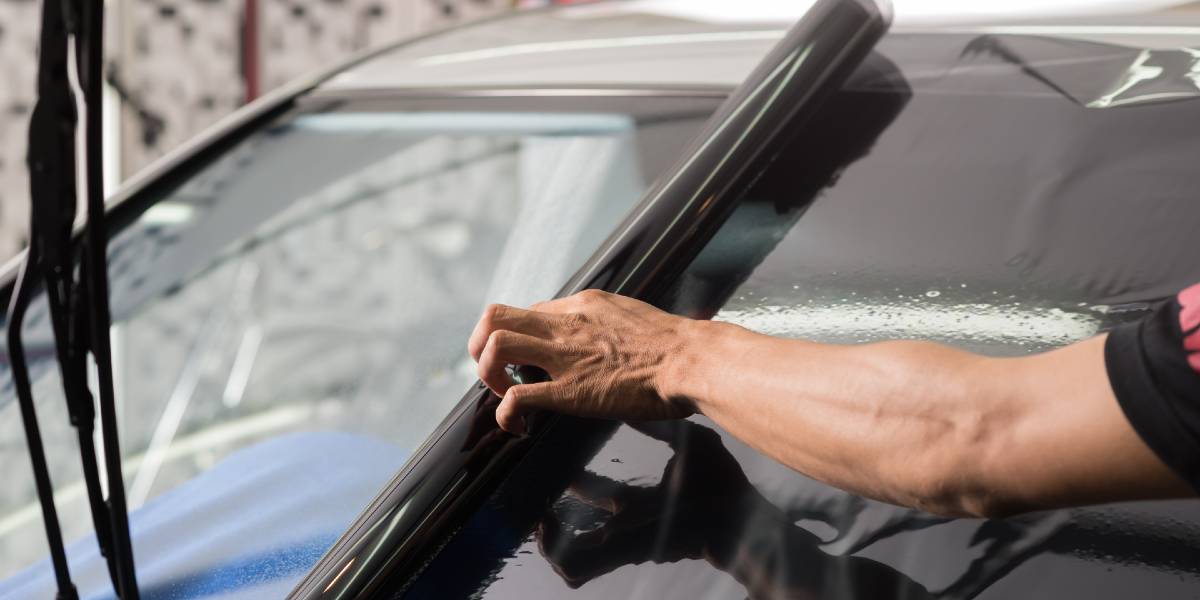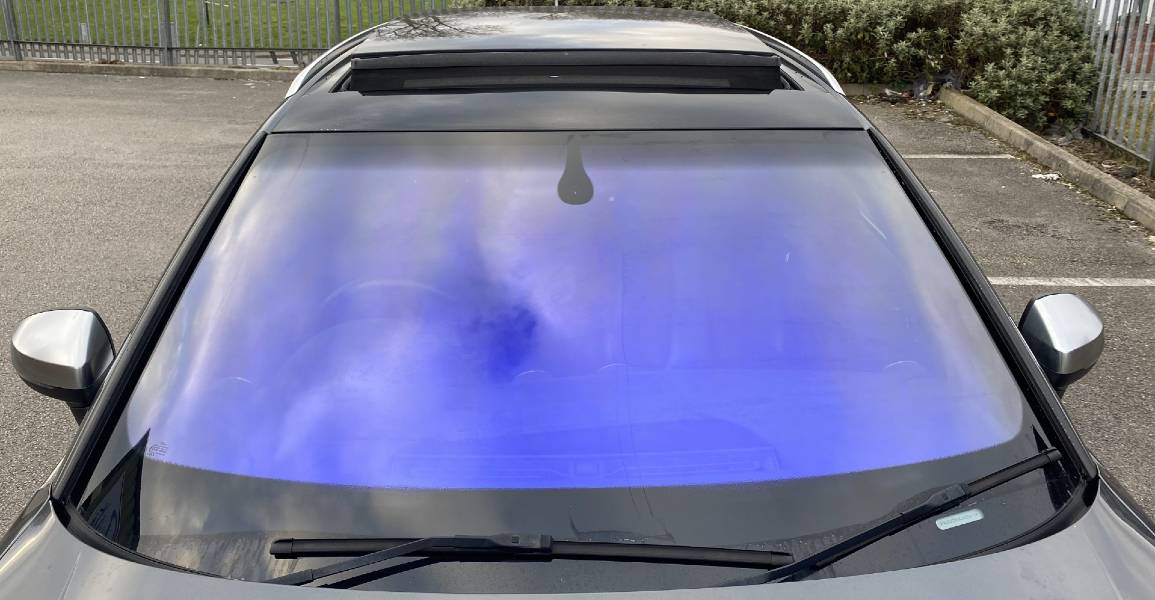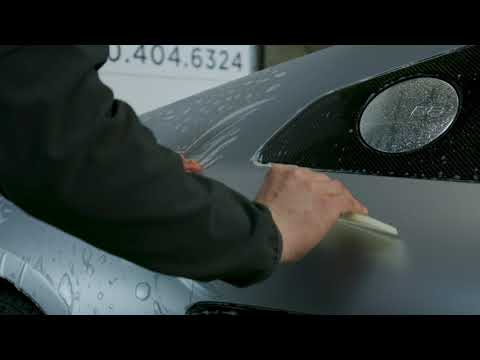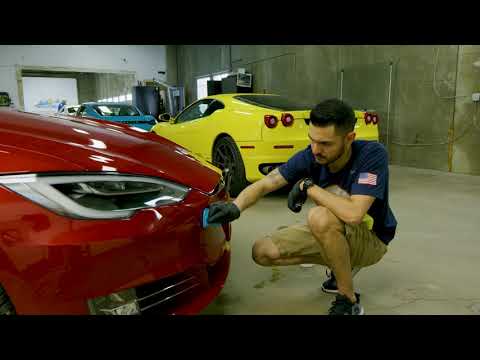Car window tint should be at the top of your list of car modifications to make. Not only do they lend a lustrous appearance to your car, the Skin Care Foundation even recommends their sun-blocking capabilities.
Window tints have a number of incredible benefits, but you need to be sure to pick a high-quality option and enlist the help of a professional detailer to reap all of their rewards. They’re also governed by a few legal restrictions.
Read on to learn everything you need to know about tinting your car’s windows.
- What are Car Window Tints?
- The Types of Aftermarket Tints
- What Benefits Does Window Tinting Offer?
- How to Choose a Tint
- Pros and Cons of Tinted Car Windows
- Cost of Tint
- Shades of Tint
- Tinting Laws
- Car Window Tinting Maintenance
- Tint From a Trusted Source

What are Car Window Tints?
Window tinting refers to the process of darkening a car’s windows with a polyester tint film. Its main purpose is to reduce the amount of visible light transmission (VLT) that enters your car through the windows.
VLT is measured in a percentage. These tint percentages range from 5% to 90%. A higher rating means more light is allowed to pass through the window.
Many new cars already come with tinted windows. They provide adequate protection, but if you really want to see results, you’ll have to search for an aftermarket solution.
The Types of Aftermarket Tints
There are many different brands and blends of auto window tints to choose from, but they all fall into six main categories. They range in price and quality and offer different benefits.
Learn More: Different types of window tinting for cars in Denver Colorado’s climate
No matter which tint you choose, have them installed by a professional window tinting service.
Dyed Tint
What is Dyed Window Tint? Dyed window tints are usually the cheapest and lowest quality type of window tint. They contain three layers: a polyester outer layer, a layer of dyed tint film, and an adhesive to bond the tint to the window.
This kind of tint does a respectable job absorbing heat. Dyed window films do offer some protection from the sun, but they don’t block UV rays.
Don’t expect to get prolonged use out of a dyed tint. Generally, they last less than two years before needing to be replaced. They’re also prone to bubbling which can ruin the aesthetic of your car.
Metalized Window Tint
Metalized window tints are a step above dyed tints. They make use of film infused with tiny metallic particles. and create a metallic or mirrored look, not a matte finish.
Compared to dyed tints, metalized tints are much more effective at protecting your car from the sun. The metal particles reflect sunlight as opposed to absorbing it, which helps in reducing the number of UV rays that bombard your car.
These tints have a few other benefits as well. They’re scratch-resistant and can improve the strength of your windows. Some also enjoy the metallic sheen they lend to a car.
Their biggest downside is that the metal used in their construction can interfere with radio and GPS signals.
Hybrid Tint
Hybrid tints are a combination of dyed tints and metalized tints. They’re composed of dyed film and titanium flakes.
These tints offer the best features of dyed and metalized tints. They do a good job at blocking and reflecting sunlight, strengthening your windows, and won’t obscure GPS signals.
Hybrid tints are also fairly durable. You could get up to five years of use out of them.

Carbon Tint
Carbon tints feature a film made of particles of carbon fiber. They represent a sizable step up from the previous kinds of tints.
With these high-tech tints, you’ll have serious UV-blocking capabilities. They can block up to 99% of UV rays.
Carbon tints can also reduce the amount of infrared radiation that enters your vehicle. Infrared radiation is what makes the interior of a car hot after it’s been sitting in the sun.
These tints lend a matte-like appearance to your windows. They are regarded as one of the best-looking kinds of tints on the market.
Carbon tints are among the longest-lasting window tints. They’ll serve you well for several years without fading.
Crystalline Tints
Crystalline Tints are perfect for those who want all the benefits of a carbon tint without changing the color of their windows.
These tints block UV rays and infrared radiation and are made of multiple layers of a completely clear film.
Ceramic Tints
Ceramic window tinting is the high-end option in the window tinting world. They make use of a tint film infused with ceramic particles, similar but not identical to ceramic coatings used to protect the paint.
These tints offer the best features of all tinted windows. They can block virtually all the UV rays that could enter your car and 90% of infrared radiation. This can cut the amount of ambient heat in your car in half.
They’ll also reflect the sun’s rays like a metallic tint does, but they will never interfere with your GPS or radio signals.
A well-maintained ceramic film tint can last up to a decade, but you’ll pay a premium for this kind of protection.
To Learn More: What is Ceramic Window Tint?
What Benefits Does Window Tinting Offer?
Window tints have plenty of benefits. Some of them are obvious, but others may surprise you.
Keep Your Car Cooler
There’s a massive difference in the interior temperature between cars with tinted windows and those without them. The infrared filtering capabilities of higher-end tints like carbon and ceramic contribute to this difference.
However, even lower-end tints like dye and metallic tints can help to cool a car.
In a sunny state like Colorado that claims to get 300 days of sunshine, you need the sun-blocking capabilities that tints offer to protect your vehicle.
Reduce UV Rays
Skin cancer is one of the most common kinds of cancer in the United States, and the sun’s UV rays are a leading cause of it. You can protect yourself from it while you drive by installing tints on the windows of your car. That’s why they’re strongly recommended by the Skin Care Foundation.
You’ll have to opt for a higher-end tint to see these results, but it will be worth the investment.

Protect Your Car
Your skin isn’t the only thing that can be damaged by UV rays. They can also ruin the interior of your car.
The effects are most noticeable on dashboards and upholstery. Over time, the sun will cause these things to fade. If you have leather seats, you’ll also experience unsightly cracking.
Improved Safety
Having tints on your vehicle’s windows, make driving a safer experience in two ways.
The first is that they reduce glare, which dramatically improves your visibility on sunny days. You’ll be able to see the road and respond to situations easier.
The second is that they strengthen car windows.
Can automotive window tinting protect against shattered glass? Many tints make windows shatter-resistant, and protect against shattered glass so you won’t have to worry about getting cut by flying shards of glass in the event of a car accident.
Privacy
Darker window tints offer increased privacy. You can protect yourself and your passengers from on-lookers with a sufficiently dark tint.
They can also be a deterrent to car-related thefts. A thief won’t attempt to break into a car if they can see through the tinted window.
How to Choose a Tint
Choosing a window tint can be a difficult process. You’ll have to weigh the pros and cons of each type of tint, consider the price, and pick a shade within the legal limit in your state.
Pros and Cons of Tinted Car Windows
Those seeking the ultimate tinting solution will immediately gravitate toward ceramic tints. They have virtually no downsides.
On the other hand, dyed tints offer little more than an aesthetic upgrade and a limited amount of sun protection.
Those who rely on GPS should avoid metalized tints, as regularly dealing with the interference they generate will become frustrating.
Learn more about Car Window Tinting: 7 Key Things You Should Be Aware Of
Cost of Tint
Ceramic tints are the best-quality tints but come at the highest price. Carbon tints still offer excellent UV protection and cost a bit less than nano ceramic tints, but they are still much more expensive than low-end tints.
The fact of the matter is that if you want a quality tint, you’ll have to be prepared to invest in the cost of window tint.
Read our guide to learn more about Denver Car Window Tinting Prices and Affordable Options in Denver.

Shades of Tint
Most tints come in a variety of shades. If you want a darker shade, look for a tint with a low percentage rating.
Specifically, 35% is one of the most common shade percentages. This level offers a great deal of sun protection and is suitable for all windows, including front side windows.
Some shades are best for back windows. You can often get a darker tint on rear windows than on front windows, which allows you more protection and privacy.
Tinting Laws
Every state has laws governing how dark your window tints percentages can be. These laws often vary between states. You’ll have to determine what Colorado Window tint laws you’re subjected to and choose a tint within the legal limit.
If you don’t, you could be pulled over and issued a citation.
Car Window Tinting Maintenance
Car window tinting is a great way to reduce heat, glare and harmful UV rays while driving, but it’s important to maintain it properly to keep it looking new. Here are some car window tinting maintenance tips to help you keep your tint in top condition:
- Avoid using harsh or abrasive cleaners on your tinted windows, as they can scratch or damage the film. Instead, use a mild soap and water solution or a specialized tint cleaner recommended by your installer.
- When cleaning your tinted windows, use a soft, non-abrasive cloth or sponge to avoid scratching the film. Microfiber towels are a great choice, as they are gentle on the tint and won’t leave lint or streaks behind.
- Avoid rolling down your windows for at least a week after installation, to allow the film to fully cure and adhere to the glass. After that, you can roll down your windows as usual, but be gentle to avoid damaging the tint.
In addition to these basic maintenance tips, there are a few other things you can do to keep your car window tint looking new for longer:
- Park in shaded areas whenever possible to reduce heat and UV exposure. This will help prevent fading and discoloration of the tint over time.
- Use a sunshade or windshield cover to protect your car’s interior from direct sunlight. This will also help reduce heat buildup inside the car, making driving more comfortable.
- Avoid using sharp or pointed objects near your tinted windows, as they can scratch or damage the film. Be especially careful when loading or unloading items from your car, and avoid leaning against the windows.
Tint From a Trusted Source
Car window tint is an excellent modification. It can dramatically change the look of your car while offering many practical benefits.
There are six main types of tints to choose from. They all offer some form of sun protection, but higher-end ones can block infrared radiation and cancer-causing UV rays.
How To Find A Car Window Tinting Services Near Me
To find a car window tinting service near you, search online for local businesses or ask friends and family for recommendations. For professional window tinting in the Denver area, contact Colorado Clear Bra directly at 720-404-6324 for expert service and high-quality results.
Looking for car window tint Denver? Trust your window tint installation and tint service to Colorado Clear Bra. Our team of skilled technicians will provide you with flawless work. Contact us to see how we can help you.




